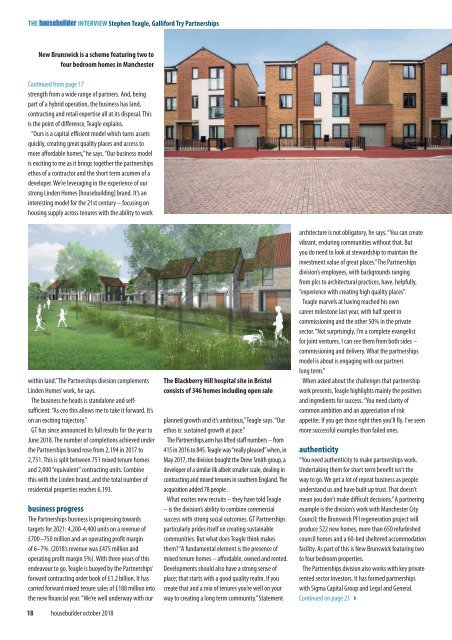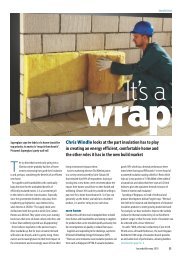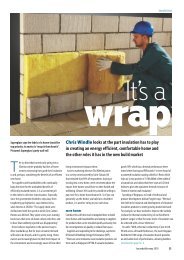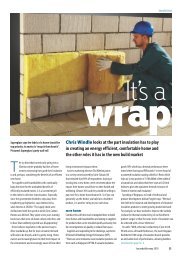Housebuilder October 2018
Create successful ePaper yourself
Turn your PDF publications into a flip-book with our unique Google optimized e-Paper software.
THE<br />
INTERVIEW Stephen Teagle, Galliford Try Partnerships<br />
New Brunswick is a scheme featuring two to<br />
four bedroom homes in Manchester<br />
Continued from page 17<br />
strength from a wide range of partners. And, being<br />
part of a hybrid operation, the business has land,<br />
contracting and retail expertise all at its disposal. This<br />
is the point of difference, Teagle explains.<br />
“Ours is a capital efficient model which turns assets<br />
quickly, creating great quality places and access to<br />
more affordable homes,” he says. “Our business model<br />
is exciting to me as it brings together the partnerships<br />
ethos of a contractor and the short term acumen of a<br />
developer. We’re leveraging in the experience of our<br />
strong Linden Homes [housebuilding] brand. It’s an<br />
interesting model for the 21st century – focusing on<br />
housing supply across tenures with the ability to work<br />
within land.” The Partnerships division complements<br />
Linden Homes’ work, he says.<br />
The business he heads is standalone and selfsufficient.<br />
“As ceo this allows me to take it forward. It’s<br />
on an exciting trajectory.”<br />
GT has since announced its full results for the year to<br />
June <strong>2018</strong>. The number of completions achieved under<br />
the Partnerships brand rose from 2,194 in 2017 to<br />
2,751. This is split between 751 mixed tenure homes<br />
and 2,000 “equivalent” contracting units. Combine<br />
this with the Linden brand, and the total number of<br />
residential properties reaches 6,193.<br />
business progress<br />
The Partnerships business is progressing towards<br />
targets for 2021: 4,200-4,400 units on a revenue of<br />
£700 – 750 million and an operating profit margin<br />
of 6–7%. (<strong>2018</strong>’s revenue was £475 million and<br />
operating profit margin 5%). With three years of this<br />
endeavour to go, Teagle is buoyed by the Partnerships’<br />
forward contracting order book of £1.2 billion. It has<br />
carried forward mixed tenure sales of £188 million into<br />
the new financial year. “We’re well underway with our<br />
18 housebuilder october <strong>2018</strong><br />
The Blackberry Hill hospital site in Bristol<br />
consists of 346 homes including open sale<br />
planned growth and it’s ambitious,” Teagle says. “Our<br />
ethos is: sustained growth at pace.”<br />
The Partnerships arm has lifted staff numbers – from<br />
415 in 2016 to 845. Teagle was “really pleased” when, in<br />
May 2017, the division bought the Drew Smith group, a<br />
developer of a similar ilk albeit smaller scale, dealing in<br />
contracting and mixed tenures in southern England. The<br />
acquisition added 78 people .<br />
What excites new recruits – they have told Teagle<br />
– is the division’s ability to combine commercial<br />
success with strong social outcomes. GT Partnerships<br />
particularly prides itself on creating sustainable<br />
communities. But what does Teagle think makes<br />
them? “A fundamental element is the presence of<br />
mixed tenure homes – affordable, owned and rented.<br />
Developments should also have a strong sense of<br />
place; that starts with a good quality realm. If you<br />
create that and a mix of tenures you’re well on your<br />
way to creating a long term community.” Statement<br />
architecture is not obligatory, he says. “You can create<br />
vibrant, enduring communities without that. But<br />
you do need to look at stewardship to maintain the<br />
investment value of great places.” The Partnerships<br />
division’s employees, with backgrounds ranging<br />
from plcs to architectural practices, have, helpfully,<br />
“experience with creating high quality places”.<br />
Teagle marvels at having reached his own<br />
career milestone last year, with half spent in<br />
commissioning and the other 50% in the private<br />
sector. “Not surprisingly, I’m a complete evangelist<br />
for joint ventures. I can see them from both sides –<br />
commissioning and delivery. What the partnerships<br />
model is about is engaging with our partners<br />
long term.”<br />
When asked about the challenges that partnership<br />
work presents, Teagle highlights mainly the positives<br />
and ingredients for success. “You need clarity of<br />
common ambition and an appreciation of risk<br />
appetite. If you get those right then you’ll fly. I’ve seen<br />
more successful examples than failed ones.<br />
authenticity<br />
“You need authenticity to make partnerships work.<br />
Undertaking them for short term benefit isn’t the<br />
way to go. We get a lot of repeat business as people<br />
understand us and have built up trust. That doesn’t<br />
mean you don’t make difficult decisions.” A partnering<br />
example is the division’s work with Manchester City<br />
Council; the Brunswick PFI regeneration project will<br />
produce 522 new homes, more than 650 refurbished<br />
council homes and a 60-bed sheltered accommodation<br />
facility. As part of this is New Brunswick featuring two<br />
to four bedroom properties.<br />
The Partnerships division also works with key private<br />
rented sector investors. It has formed partnerships<br />
with Sigma Capital Group and Legal and General.<br />
Continued on page 21 4







